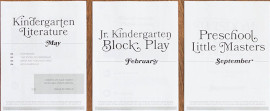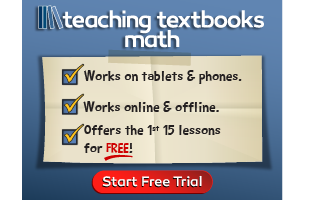Little Wonders is a secular program that provides downloadable, month-long units for three levels: preschool, pre-kindergarten (which they call junior kindergarten), and kindergarten. The program is designed around children’s storybooks and involves lots of hands-on activities. You can subscribe by the month or by the school year (nine months). The units have different content for each level, and a subscription will give you access to all three levels at the same time. However, it isn’t very feasible to teach more than one level at a time because they use different books and resources, and each level requires quite a bit of time to prepare and teach.
The nine units for the school year each have three different types of files, and you can subscribe to only one or two, or you can subscribe to a bundle of all three. The three types of files are titled Literature, Block Play, and Little Masters. Each file type has a primary emphasis but also teaches across many subject areas in a unit-study fashion, possibly touching on science, social studies, math, and motor skills. When used together, all three file types in the nine school-year units provide more than enough coverage of language arts (aside from reading), social studies, science, and art. These units can be used out of order if you wish.
Literature files spend the most time on language arts, although the other two files each revolve around a single children’s book for each month. The Literature files have specific lessons each week for art, spatial thinking, poetry, nature, fine motor skills, journaling, sensory activities (discovery, play, and discussion related to the five senses), and nourishment activities (that involve food).
Block Play deals primarily with spatial reasoning and critical thinking. It includes lessons on mapping (home, neighborhood, and community), building with blocks and other manipulatives, working with puzzles and shapes, and vocabulary related to direction and position. Extension activities in Block Play stretch into art, games, creativity, language arts, social studies, and other areas.
Little Masters focuses on art appreciation, artists, artworks, and art projects. You will have noticed that arts and crafts activities also show up in the other two types of files.
As I mentioned previously, you can subscribe to only one or two types of files each month, or you can subscribe to all three. Each of the files can be used on its own. They are not interdependent. The Literature files are about twice the size of the others and provide the most substantial part of the program. You could use the Literature files without the other two and still have plenty of learning activities, especially if you use them alongside math and reading programs.
The lesson plans show sample schedules that are especially helpful when you are using all three types of files. Literature file activities will occur every day, while those from the other files do not. The files explain exactly what needs to be done and what resources you will need. You will work through the lesson activities in order for the most part.
Little Wonders can be used on its own prior to kindergarten. When you decide to start teaching math and reading—subjects that need to be taught sequentially—you must add other resources. This will generally be at the kindergarten level. The Wisdom Wonder Project created their Singapore Math videos for teaching the Singapore math program to kindergartners, but you can use whatever programs you wish for math and reading.
You can also purchase three summer units that are bundled as a group of files for all three months for each of the three types of files rather than for a month at a time. The summer units are a little lighter than those for the regular school year, and you are welcome to substitute a summer unit during the school year if need be.
Required Resources
You will need a number of resources to utilize the Little Wonders lessons. You do not have to do all of the activities, but you should plan ahead to select those you will use and gather what you need.
The children’s storybooks used for the lessons are essential, and you should be able to borrow them from the library. The Literature file for each month provides weekly lesson plans centered around a featured children’s storybook for the week and includes questions to help guide discussion. For instance, the kindergarten Literature file for May plans the lessons around the four storybooks Roxaboxen by Alice McLerran, The Story of Ferdinand by Munro Leaf, Make Way for Ducklings by Robert McCloskey, and Miss Rumphius by Barbara Cooney. Little Masters and Block Play units each require only one children’s storybook per month. For example, the kindergarten units for May use The Wall in the Middle of the Book by Jon Agee for Block Play and A Splash of Red by Jen Bryant for Little Masters. (Block Play and Little Masters units also include complete lesson plans.)
The files list required resources, differentiating between those that will be used for many of the monthly units and those needed for a month or less. For example, every Literature file for kindergarten shows five resources (with links to Amazon.com) that will be needed for the year across all of the monthly units: a literature journal, a utility tub, a nature journal, a fine-motor tool kit, and food coloring. It also recommends that you have on hand the book Favorite Poems Old and New that will be used all year. Then you need additional resources for each week. In the files, there’s a link to a page on their website titled “Setting up Your Space: Little Wonders” that has a list of basic supplies, such as paintbrushes, popsicle sticks, tempera paint, watercolors, cardstock, scissors, crayons, and paper plates. For example, in the May Literature study for kindergarten, for the week when you read The Story of Ferdinand there is a list of required items, such as a pencil, cardstock, a Sharpie® marker, either butcher paper or a growth chart, a bowl, a bucket, plastic cups, squares of wrapping tissue in many colors, and a bunch of rubber bands. The Literature files provide these supply lists for each week so you can quickly see what you need. The junior kindergarten level has similar lists, and these are being added to the preschool units as I write this review.
Similarly, the Little Masters units list required resources that will be used across most units, as well as resources for each month. For instance, the kindergarten level requires watercolor paper, clear plastic paint bottles, a color wheel, and a paint palette as basic supplies for most units. Individual units for each month require a specific children’s storybook plus other art media and supplies such as acrylic paints, air-dry clay, charcoal, pastels, shaving cream, eyedroppers, jars, and glue sticks.
Block Play units for both the junior kindergarten and kindergarten levels require a set of jumbo cardboard blocks and a set of wooden peg people as the basic supplies. As with the Literature and Little Masters units, many more items are listed for each month. These might be items such as butcher paper, construction paper, markers, yarn, stamp pads, watercolor pencils, a world map, a calendar, wooden cubes, Legos®, and pentominoes. Block Play for preschool lists different items for each month.
Summer Units
The three types of files included in the summer units for each level are titled Fairy Tales; Scribble! Stick! Splat!; and Fairies, Forts, & First Machines. These units correspond roughly to the three regular units: Literature, Little Masters, and Block Play, respectively.
Fairy Tales files use The Golden Book of Fairy Tales as the source for all of the stories rather than individual books. The Fairy Tales lessons are constructed around one fairy tale each week. Scribble! Stick! Splat! and Fairies, Forts, & First Machines each use a single children’s storybook for each month. Scribble! Stick! Splat features art activities while Fairies, Forts, & First Machines has children build and construct all sorts of things.
All of the lessons are directed toward discussion of the books, art activities, and building or construction activities rather than academics. There are occasional nature walks or activities that touch on critical thinking, social studies, and math, but the overall approach is more reliant on hands-on activities for the summer months.
Summary
Little Wonders provides a developmentally appropriate mix of activities that introduces children to wonderful stories and provides plenty of hands-on activities. The biggest challenge is likely to be the time involved in gathering resources and presenting the activities.








